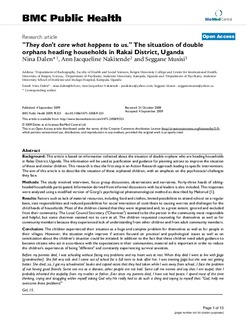| dc.description.abstract | Background This article is based on information collected about the situation of double orphans who are heading households in Rakai District, Uganda. The information will be used as justification and guidance for planning actions to improve the situation of these and similar children. This research is thus the first step in an Action Research approach leading to specific interventions. The aim of this article is to describe the situation of these orphaned children, with an emphasis on the psychosocial challenges they face. Methods The study involved interviews, focus group discussions, observations and narratives. Forty-three heads of sibling-headed households participated. Information derived from informal discussions with local leaders is also included. The responses were analyzed using a modified version of Giorgi's psychological phenomenological method as described by Malterud [1]. Results Factors such as lack of material resources, including food and clothes, limited possibilities to attend school on a regular basis, vast responsibilities and reduced possibilities for social interaction all contribute to causing worries and challenges for the child heads of households. Most of the children claimed that they were stigmatized and, to a great extent, ignored and excluded from their community. The Local Council Secretary ("Chairman") seemed to be the person in the community most responsible and helpful, but some chairmen seemed not to care at all. The children requested counseling for themselves as well as for community members because they experienced lack of understanding from other children and from adult community members. Conclusion The children experienced their situation as a huge and complex problem for themselves as well as for people in their villages. However, the situation might improve if actions focused on practical and psychological issues as well as on sensitization about the children's situation could be initiated. In addition to the fact that these children need adult guidance to become citizens who act in accordance with the expectations in their communities, material aid is important in order to reduce the children's experiences of being "different" and constantly experiencing survival anxieties. Before my parents died, I was schooling without facing any problems and my heart was at rest. When they died I went to live with Jjajja [grandmother]. She fell very sick and I came out of school for a full term to look after her. I was treating Jjajja but she was not getting better. She died...so...I got my schoolmates' books and copied notes that they had taken while I was away from school...I face the problem of not having good friends. Some see me as a disease...other people are not bad. Some call me names and say that I am stupid, that I probably inherited the stupidity from my mother or father...Ever since my parents died, I have not had peace. I spend most of the time thinking, crying and struggling within myself asking God why He really had to do such a thing and saying to myself that: "God, help me overcome these problems!" Girl, 15. | en_US |
